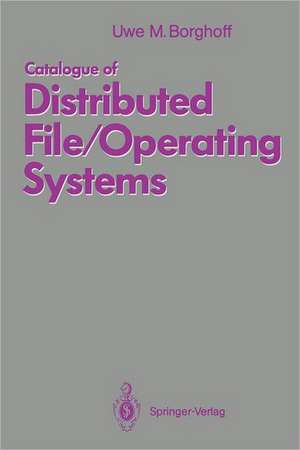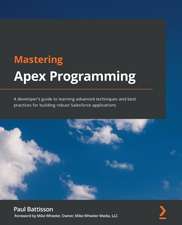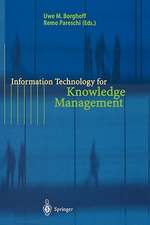Catalogue of Distributed File/Operating Systems
Autor Uwe M. Borghoffen Limba Engleză Paperback – 9 ian 1992
Preț: 329.26 lei
Preț vechi: 411.57 lei
-20% Nou
Puncte Express: 494
Preț estimativ în valută:
63.02€ • 68.48$ • 52.97£
63.02€ • 68.48$ • 52.97£
Carte tipărită la comandă
Livrare economică 21 aprilie-05 mai
Preluare comenzi: 021 569.72.76
Specificații
ISBN-13: 9783540544500
ISBN-10: 354054450X
Pagini: 232
Ilustrații: XI, 214 p.
Dimensiuni: 155 x 235 x 12 mm
Greutate: 0.33 kg
Editura: Springer Berlin, Heidelberg
Colecția Springer
Locul publicării:Berlin, Heidelberg, Germany
ISBN-10: 354054450X
Pagini: 232
Ilustrații: XI, 214 p.
Dimensiuni: 155 x 235 x 12 mm
Greutate: 0.33 kg
Editura: Springer Berlin, Heidelberg
Colecția Springer
Locul publicării:Berlin, Heidelberg, Germany
Public țintă
ResearchCuprins
1 Introduction.- 1.1 Presentation of a Catalogue of Criteria.- 1.2 Organization of the Survey.- 2 Traditional Distributed File Systems.- 2.1 Alpine.- 2.2 Andrew File System (AFS).- 2.3 Cedar File System (CFS).- 2.4 Coda.- 2.5 Extended File System (EFS).- 2.6 HARKYS.- 2.7 IBIS.- 2.8 Network File System (NFS).- 2.9 Remote File Sharing (RFS).- 2.10 S-/F-UNIX.- 2.11 Spritely NFS.- 2.12 VAXcluster.- 2.13 Xerox Distributed File System (XDFS).- 3 Object-Oriented Distributed File Systems.- 3.1 DOMAIN.- 3.2 Helix.- 3.3 SWALLOW.- 4 Traditional Distributed Operating Systems.- 4.1 Accent.- 4.2 Cambridge Distributed Computing System (CDCS).- 4.3 Charlotte.- 4.4 DEMOS/MP.- 4.5 DIOS.- 4.6 Distributed Academic Computing Networking OS (DACNOS).- 4.7 DUNE.- 4.8 DUNIX.- 4.9 Freedomnet.- 4.10 HERMIX.- 4.11 JASMIN.- 4.12 LOCUS.- 4.13 MACH.- 4.14 Multicomputer Operating System (MOS).- 4.15 Newcastle Connection.- 4.16 PULSE.- 4.17 QuickSilver.- 4.18 Research Oriented Distributed Operating System (RHODOS).- 4.19 Saguaro.- 4.20 Sprite.- 4.21 V.- 4.22 WANDA.- 4.23 Wisdom.- 5 Object-Oriented Distributed Operating Systems.- 5.1 Alpha.- 5.2 Amoeba.- 5.3 Argus.- 5.4 BirliX.- 5.5 Chorus.- 5.6 Clouds.- 5.7 Cronus.- 5.8 Cosmos.- 5.9 Eden.- 5.10 Gothic.- 5.11 Grenoble Universities Integrated Distributed Environment (Guide).- 5.12 Gutenberg.- 5.13 MARUTI.- 5.14 NEXUS.- 5.15 Process Execution And Communication Environment (PEACE).- 5.16 Profemo.- 5.17 Prospero.- 5.18 SOMIW Operating System (SOS).- 6 Closely Related Systems.- 6.1 Athena.- 6.2 Avalon.- 6.3 DAPHNE.- 6.4 DASH.- 6.5 Emerald.- 6.6 Enchère.- 6.7 Galaxy.- 6.8 Global, Active and Flexible File Environment Study (GAFFES).- 6.9 Grapevine.- 6.10 Heterogeneous Computer System (HCS).- 6.11 Incremental Architecture for Distributed Systems (INCAS).- 6.12ISIS.- 6.13 Medusa.- 6.14 Meglos.- 6.15 Mirage.- 6.16 Network Computing Architecture/System (NCA/NCS).- 6.17 Plan 9.- 6.18 Psyche.- 6.19 Server Message Block Protocol (SMB).- 6.20 Symunix.- 6.21 Synthesis.- 6.22 x-Kernel.- 7 Table of Comparison.- 8 Related Projects.- 8.1 Acorn.- 8.2 Agora.- 8.3 Amber.- 8.4 Arachne.- 8.5 Arca.- 8.6 Arcade.- 8.7 Archons (ArchOS).- 8.8 Argos.- 8.9 Arjuna.- 8.10 Boston Community Information System (BCIS).- 8.11 Camelot.- 8.12 Carnegie Mellon Central File System (CMCFS).- 8.13 Choices.- 8.14 Circus.- 8.15 Clearinghouse.- 8.16 Cocanet.- 8.17 Computing System for Societies of Agents (CSSA).- 8.18 CONIC.- 8.19 Customer Information Control System (CICS).- 8.20 Datacomputer.- 8.21 Deceit.- 8.22 DEMOS.- 8.23 DFS925.- 8.24 DISTRIX.- 8.25 Dragon Slayer.- 8.26 Echo.- 8.27 Encompass.- 8.28 Felix.- 8.29 Ficus.- 8.30 FileNet.- 8.31 Firefly.- 8.32 Generic File System (GFS).- 8.33 Helios.- 8.34 HERON.- 8.35 Intelligent Distributed Resource Processing System (IDRPS).- 8.36 Interim Füe System (IFS).- 8.37 Language for Distributed Systems (LADY).- 8.38 Lynx.- 8.39 Management of Distributed Systems (MANDIS).- 8.40 Melampus.- 8.41 Meta.- 8.42 MICROS.- 8.43 MODOS.- 8.44 Munin.- 8.45 Network Workstations (NEST).- 8.46 Networked Resource Discovery Project (NRDP).- 8.47 NonStop.- 8.48 Onyx.- 8.49 PHARROS.- 8.50 Presto.- 8.51 R?.- 8.52 Rapport.- 8.53 RNFS.- 8.54 Rochester’s Intelligent Gateway (RIG).- 8.55 ROE.- 8.56 Roscoe.- 8.57 RSS.- 8.58 RT PC Distributed Services.- 8.59 S/Net’s Linda Kernel.- 8.60 Sesame.- 8.61 StarOS.- 8.62 STORK.- 8.63 Thoth.- 8.64 TimixV2.- 8.65 Topaz (Taos).- 8.66 Transparent Integrated Local and Distributed Environment (TILDE).- 8.67 Transparent Remote Füe System (TRFS).- 8.68 Trollius (Trillium).- 8.69 Universal Poly-Processorwith Enhanced Reliability (UPPER).- 8.70 Woodstock File Server (WFS).- 8.71 Xcode.- 8.72 Z-Ring File Server.









